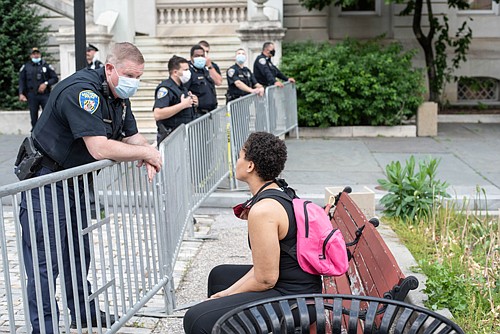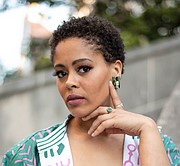As I sat in a sunny Mt. Vernon park and ate my lunch on Saturday afternoon, I tried to prepare my mind for the protest I would be attending later. I felt the weight of my city’s pain and was conscious of the fact that day I would have to be willing to sacrifice everything to support the cause of justice.
What I didn’t prepare for, what I couldn’t have known to prepare for, was the heartbreak.
We took to the front lines of the protest and marched through most of the city. It was a long, hard march. We were in pain emotionally and physically, our voices grew weak from the repetitive shouts of the names of the slain and the demands of the people, and there were moments of hopelessness when white diners at luxury establishments moved indoors to avoid us.
Alisha Wallace
Jasmine Garland
Then, I watched as a young white man in Fells Point rolled his eyes, removed the lid of his plastic beer cup and flung it into the crowd— I broke, as did many others. The question raging in my mind was how? How can you not support our movement, how can you not see our pain?
It was in his eyes. He did not see me.
As we faced police officers in front of City Hall— without yelling, without crying— I asked “Do you love us? Do you understand our pain? Do you fight for us?”— with no answer. I removed my mask and sunglasses. I wanted to be a person, someone you see in the grocery store or on the same pew at church. The worst thing that could’ve happened, the thing I couldn’t have known to prepare for, was the avoidance of my stare.
I stared deeply into the eyes of black and brown police officers, I begged them to look back, chanted “look me in my eyes” and they looked away. Never meeting my eyes, never meeting my pain. I have felt unimportant before but never completely unseen.
As the protest died down and protestors took a rest on the grass of City Hall, I approached an officer. His bright blue eyes met mine honestly and I felt a moment of relief— I was real to someone, a white man no less. He explained that officers are trained not to show emotion, not to voice an opinion, just to do their jobs. As he spoke, I realized the fundamental problem we face as a nation: police officers are taught to look past the pain they see every day because if they saw us as people, if they saw us as their family, they could never choose a side.
Instead, they must act as if it’s us against them whether it’s on the protest line, whether it’s regarding petty crimes, whether the person they face is mentally handicapped or poor, or a broken product of their environment. They are not allowed to feel for us and therefore we lose the fundamental component that brings our society together— love.
It takes love to let a kid go for a petty crime he committed to impress his friends or make money for his family. It takes love to think twice before murdering someone out of fear, anger or prejudice. It takes love to stand up to other corrupt police officers to protect an unarmed man. It takes love to overcome your pride and take the knee. It takes love to bear the harsh criticisms you face even though you are a good cop; to know that the blue uniform you wear represents a symbol of hate for many people because of the system that employs you. It takes love to show up to work every day not just with the goal of staying alive but to protect the lives, even, of assumed lawbreakers. It takes love to build a system that rehabilitates criminals rather than erase their sense of humanity and take away their dignity.
This is why the love has been trained out of them. Because a system with love at its heart does not finance the prison industrial complex and it does not maintain the control of slaves. A system founded on love in service of the people sees whole people, supports them and as a result it protects them. All people. Black people. Us.
Many of us felt that heartbreak and continue to feel it as we march for peace. Beyond anger, there is heartbreak. We are desperate for love; we are desperate for healing. The absence of love in our community and the growth of our desperation can be seen in the fires lit across America. This is the same fire that burns in our hearts. Only love can calm the flames. Only love can rebuild our country.

